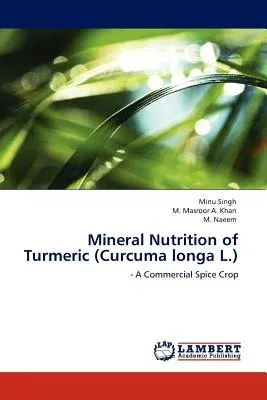Minu Singh
(Author)Mineral Nutrition of Turmeric (Curcuma longa L.)Paperback, 5 July 2011

Qty
1
Turbo
Ships in 2 - 3 days
In Stock
Free Delivery
Cash on Delivery
15 Days
Free Returns
Secure Checkout
Print Length
88 pages
Language
English
Publisher
LAP Lambert Academic Publishing
Date Published
5 Jul 2011
ISBN-10
3845400218
ISBN-13
9783845400211
Description
Product Details
Book Format:
Paperback
Country of Origin:
US
Date Published:
5 July 2011
Dimensions:
22.86 x
15.24 x
0.53 cm
ISBN-10:
3845400218
ISBN-13:
9783845400211
Language:
English
Location:
Saarbrucken
Pages:
88
Publisher:
Weight:
140.61 gm

